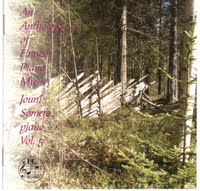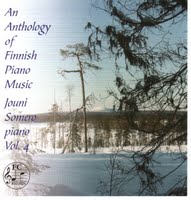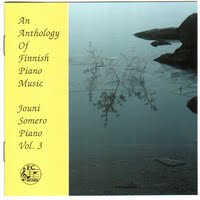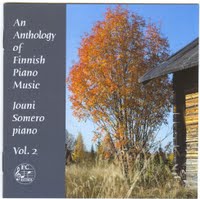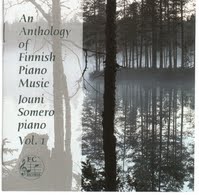Vol.5 FCRCD-9722 10 €
Väinö Raitio (1891- 1945): Barcarolle, Pastorale
Helvi Leiviskä (1902- 1982): Sonatiini F-duuri
Tauno Pylkkänen (1918- 1980): Prelude
Nils-Eric Fougstedt (1910- 1961): Variations chromatiques
Ernst Pingoud (1887- 1942): Tango oriental
Einari Marvia (1915- 1997): In memoriam op.7
Yrjö Kilpinen (1892- 1957): Sonate nr.6 op.81
Vol.4 FCRCD-9718 10 €
Oskar Merikanto (1868- 1924): Albumblad op.3, Romanssi op.12, 2 Impromptus op.44, Lastu op.76/2, Lied op.92/1
Erkki Melartin (1875- 1937): 3 Stücke op.8, Visan om Lappland, Regen op.52/4, Barcarole op.59/1 6 Stücke op.118
Leevi Madetoja (1887- 1947): Pieni satu op.31/3, Vanha muisto op.31/4, Jardin de la Mort op.41
Vol.3 FCRCD-9717 10 €
Selim Palmgren (1878- 1951): Suite op.3, Intermezzo (left hand only)
Erns Linko (1889- 1960): Sarja vanhaan tyyliin op.1, Preludes op.6 nr.1-3, Nocturne op.2/3
Ilmari Hannikainen (1892- 1955): Variations fantasques op.19, Valse sentimento
Vol.2 FCRCD-9713 10 €
Oskar Merikanto (1868- 1924): Valse a'la Chopin, Valse Lente
Edith Sohlström (1870- 1934): Elegia
Axel von Kothen (1871- 1927): Andante con moto, Impromptu
Toivo Saarenpää (1882- 1948): Sinikellot haudalla
Toivo Kuula (1883- 1918):Häämarssi, Lampaanpolska
Heino Kaski (1885- 1957): Pankakoski, Lapsi äitinsä sylissä, Walamo, Preludi Ges
Armas Maasalo (1885- 1960): Hämärässä, Adieu, Amie, Chanson d'amour, Valsette, Polka
Carl Hirn (1886- 1949): Goldfisch, Aquarelle
Felix Krohn (1898- 1963): Vanhassa puistossa
Ilmari Hannikainen (1892- 1955): Keskustelu op.11/3
Vol.1 FCRCD-9711 15 €
Thomas Byström (1772- 1839): Air Russe variée
Fredrik Lithander (1773- 1843): Variations on a Theme by Haydn
Carl Collan (1828- 1871): Fantasia,Du är min ro (arr.Karl Ekman)
Gabriel Linsén (1838- 1914): Fantasia
Robert Kajanus (1856- 1933): Albumblatt, Reiterstück
Karl Flodin (1858- 1925): Gavotte de Mona Lisa, Suite Mignonne
Jean Sibelius (1865- 1957): 6 Impromptus op.5
Armas Järnefel (1869- 1899)t: 3 Klavierstüke op.4
Erns Mielck (1877- 1899): 2 Impromptus, Sarabande
Rewie Musicweb international 11/2011
Jouni Somero's ambitious and wide-ranging survey of the solo piano music of Finland is unique in its span. That said, the latest piece here dates from 1943 so there is clearly room for another set to take us through the following six decades into the 21st century.
Somero is an experienced and sensitive practitioner having recorded Bach, Liszt including his transcriptions of Beethoven symphonies 1 and 5, Bach-Busoni, Mussorgsky, Brahms, Kempff and a series of FinnConcert discs of the piano music of Felix Blumenfeld not to mention the complete piano music of Einojuhani Rautavaara.
While some things in the present survey are routine effusions suitable for the salon and domestic piano library markets others arouse more musical interest.
Let's address the music disc by disc. Speaking of which there are five volumes and six discs. This is accounted for by volume 1 comprising two CDs in one slim-line case.
Somero provides the contextual notes for each disc and the fluent translations into English were made by Paul Forsell.
Volume 1 - The works by Byström and Lithander are key pleasant Mozartean derivatives. The CollanFantasia and Du ar min ro lean on Beethovenian examples but hold the attention as does Linsen's sprightlyFantasia. Sibelius's friend Robert Kajanus was not above perpetrating some blithe little essays and even a less joyous one in the shape of the Erlkonig dark Reiterstuck. Perhaps Sibelius knew the latter. This might have suggested the ostinato in Nightride and Sunrise which Sibelius said was inspired by a railway journey.Flodin's pieces move fluently between Chopin and Brahms in his Suite Mignonne. The op. 5 SibeliusImpromptus have deliberation and gravity of address. They stand out in this company. The icy spirals of the penultimate piece are memorable as is the touchingly fine sixth Impromptu even if it is rather Viennese. The Op. 4 Klavierstucke by Järnefelt are successful and well worth presenting in concert. They have an exuberant Rachmaninovian patina - very striking. Mielck's Symphony has been recorded by both Ondine (ODE1019-2- Oramo) and Sterling (CDS1035-2 - Lintu). He was a favoured pupil of Max Bruch and hisImpromptus are dramatic in the grand manner. We end with Mielck's dignified and slow-pulsed melancholicSarabande.
Volume 2 - nails its colours to the mast with its title, Morceaux de Salon. That said there are a few pieces here that transcend the genre. Oskar Merikanto is frank about his tremulous and really lovely Valse à la Chopin. Well worth tracking down. The Valse Lente is also touching. We need to hear more from this composer. He's not specially original but what he does is superbly carried off thanks to Somero. The pieces by Sohlstrom, von Kothen, Saarenpaa are also rather nice and tend towards soliloquy and forest pools.Kuula has recently benefited from a stunning Dutton CD (CDLX7272) of his orchestral music and these two unassuming mood-pieces show his leaning towards impressionistic textures. Heino Kaski's Symphony was broadcast on BBC Radio 3's Through the Night programme not so long ago (did anyone get a recording - I missed it and would love to hear it) and Ian Lace, whose judgement is very sound, rated it highly. Kaski's four piano solos are written in a Rachmaninovian vein with the Pankakoski furiously and stormily impressive. Superb! The little pieces by Armas Maasalo are fragile album-leaves in the manner, but not the language, of Schumann - long on charm but not profound. Hirn's glistering Goldfisch might be thought of as a sort of Lisztian equivalent of Scott's Rainbow Trout. In fact the nicely tentative Aquarelle places him much closer to Scott - at least at first though Sinding might be a better parallel. The five Krohn works are placid character pieces - a little step forward from the smaller genre miniatures by Macdowell. Ilmari Hannikainen is represented by the thoughtful but forgettable Keskustelu.
Volume 3 - starts out with Palmgren's Suite op. 3. Palmgren is best known to me for his attractive Second Piano Concerto The River recorded on LP for Fennica SS4 by Japanese pianist Izumi Tateno with the Helsinki Philharmonic Orchestra and Jorma Panula. All five concertos can now be had on a now-deleted Warner Ultima duo. The Schumann-indebted Suite is fairly unremarkable though there are more than sparks in thePapillon: Macdowell and water. Tampere-born Linko's op. 1 goes through the Bach-Busoni motions in a series of classical dance forms. The Air stands out in this company. The Nocturne is far from sleepy though it dreams commandingly enough. Of the three examples we hear from his 24 Preludes (1917) the here-and-gone little Capriccio is a pleasing experience.
Ilmari Hannikainen ended volume 2. He ends this one too. Here however he towers over the others with his brilliant and provocative half hour long Variations Fantasques op. 19. Hannikainen came from the same gifted musical family as conductor Tauno Hannikainen and was half of a touring piano duo with Alexander Siloti. Hannikainen plays out the disc with another piece of routine pallid emotion in Valse sentimento.
Strangely enough, for this volume, the Finnish notes by Somero are not translated in full into English. Shame!
Volume 4 - The music of three composers are heard here in continuous groupings.
Oskar Merikanto made a good impression with his attractive waltzes at the start of Volume 2. There are six pieces here dating from between 1891 and 1916. They're all in the grand manner - try the G flat majorImpromptu. In the case of the Romanssi he leans, with utmost tenderness, on the example of Chopin again. Indeed the Polish master haunts many of these pages.
Erkki Melartin's six symphonies are on Ondine and should really be given a new lease of life by being reissued as a boxed set. His operas have also been recorded: Aino on Bis. He is present here with twelve pieces. While the Elegie feels stodgy the Romance has a lighter more imaginatively romantic touch. Depth and a deftly deliberate way hold the attention throughout Die Nacht. The predominance of German titles rather gives away his intended market and probably his then publishers; after all Breitkopf und Härtel were Sibelius’s publishers. These are slowly turned pieces not quickly spun. On the other hand his Hexe (Witch),Irrlichten and Trolltanz are exercises in gawky, gangly and sometimes Lisztian grotesquerie. He is a much more interesting composer in this vein.
Leevi Madetoja's orchestral music has been methodically and superbly recorded by Alba. His symphonies are on Warner Ultima-Finlandia (685738197125) and Chandos. To get to hear these at their best go straight to the Warner one-off collection on Apex and start with the Second Symphony as supremely directed by Paavo Rautio - when do we hear about him otherwise? Madetoja is well worth exploring though nothing quite tops the Second Symphony. His five piano pieces here include the touching Vanha muisto from 1915. A work of his, featured here, and recorded by several Scandinavian pianists over the years is Jardin de la Mort (1918-21). The memento mori mood is wonderfully and far from gloomily sustained. In the case of the first movement the playing is quite mesmerising. The whole suite drifts in an entrancing haze between proto-impressionism and dramatic dignity. The first of the three pieces was written in memory of Leevi's brother Yrjö who had been killed in the Finnish Civil War of 1918. The other two were added a few years later. By the way, Madetoja had the pre-eminent Finnish folk instrument, the kantele, as his main instrument.
Volume 5 - is the last disc in this significant series. It contains the most modern music. Mind you, by that I mean pieces written between 1914 and 1943; mostly from the 1930s.
Raitio's orchestral works were insightfully recorded on Fennica LPs by Berglund (Moonlight on Jupiter) and Fougstedt (Felis Domestica). There are also good collections on Ondine. Some of his more substantial works can be heard on Ondine ODE790-2 conducted by Jukka-Pekka Saraste: Fantasia poetica, Fantasia estatica,The Swans, The Column Fountain and Antigone. He had a way with titles. His Barcarolle passes without leaving any abiding trace but the hypnotic Pastorale is quite another matter.
Helvi Leiviska is the only female Finnish composer here. Her 1939 Sonatina is an occasionally sober and concise three movement affair steadily rising to stony brilliance.
The fascinating Tauno Pylkkanen is best known - where his name is recognised at all - for his nine operas. I would very much like to hear more of his music if anyone has access to radio recordings. In this case one of his only two solo piano pieces is heard. This Prelude is a very fluent affair. The manner is rhetorical and grandiloquently convincing.
The conductor Nils-Erik Fougstedt was also a composer. His rigorously disciplined Variations chromatiquesare followed by Ernest Pingoud's exotic Tango Oriental. Pingoud like Raitio was a deeply imaginative and creative composer. He too enjoys a collection of iridescent orchestral music on Ondine. It’s ODE 875-2 which comprises: Le Prophète, Chantecler, Flambeaux éteints, Le Fétiche and Le Chant de l'espace played by Finnish Radio Symphony Orchestra/Sakari Oramo. There are two unrecorded symphonies. Marvia's relentlessly steady In memoriam is less vividly coloured - more earnest as one would expect but surprisingly introducing dissonance.
To end the series Somero plays the often adventurously kinetic and dissonant four movement Sonata No. 6 by the song composer Yrjo Kilpinen. It's not at all what I had expected ... a good thing!
All these works are heard in healthy open recordings. Across the discs there's little perceptible variation in sound quality apart from a slightly enhanced warmth that comes with the change of venue after volume 2.
The axiomatic attractions of this set are added to by the generous quota of premiere recordings. One only wonders what Somero chose to leave out on grounds of space limitations. Perhaps further volumes are in the pipeline if FC Records are willing and if LUSES and ESEK can allocate further funding.
These five volumes together amount to a generous and adventurous cross-section of Finnish piano music in elite readings.
Rob Barnett
A generous and adventurous cross-section of Finnish piano music in elite versions and healthy open recordings.
KOKO TUOTANTOMME löydät Katalogista. Yksittäiskappaleita voi tilata suoraan sähköpostitse info@fcrecords.fi tai verkkokaupoista www.naxosdirect.fi ja www.fuga.fi

